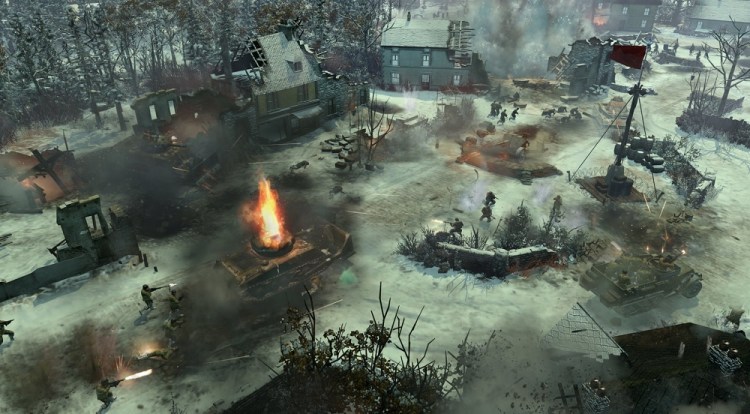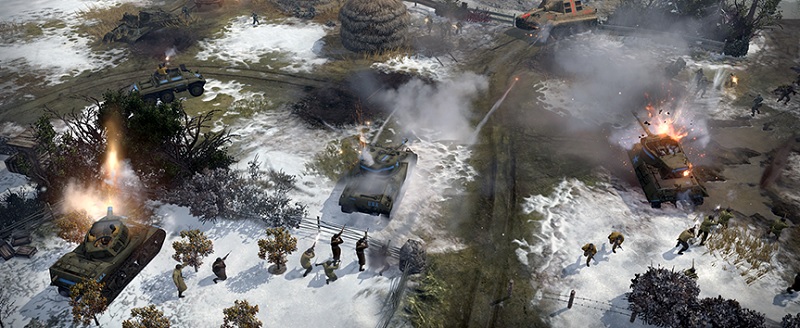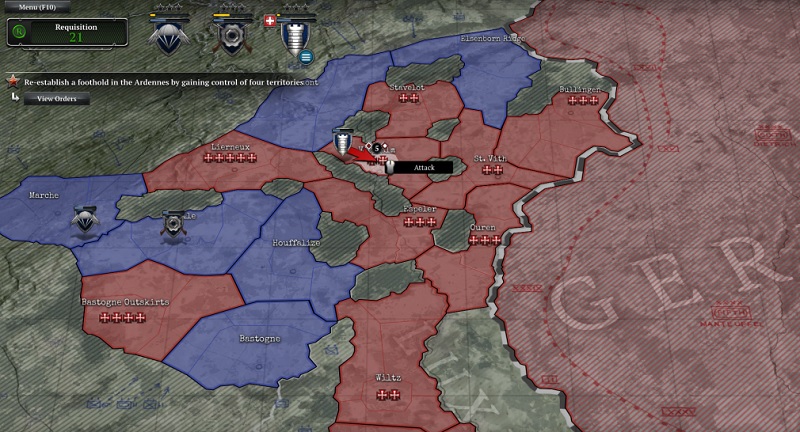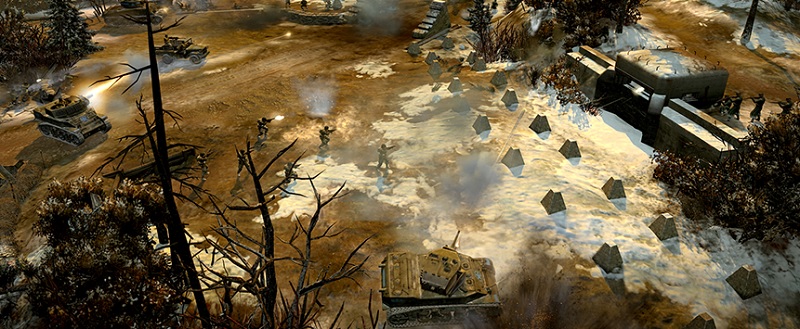Check out our Reviews Vault for past game reviews.
All is not quiet on the Western Front.
Sega’s Company of Heroes 2: Ardennes Assault (available now for Windows PCs) depicts the Battle of the Bulge in World War II, which represented Adolph Hitler’s last stab at glory after the successful Allied invasion of France. Hitler launched an all-out tank assault with more than 400 tanks and nearly 300,000 soldiers in a surprise attack in the Ardennes forest of Belgium in December 1944. The attack created a giant bulge in the American lines, and it’s your job as the American commander to close that bulge amid difficult conditions in the middle of winter.
I relived that battle as commander of three fictional U.S. Army companies — Able (airborne), Baker (mechanized), and Dog (support) — in the real-time strategy game. Ardennes Assault is the latest extension of Relic’s Company of Heroes 2, which debuted last year with a focus on the chilly Russian front. Relic followed that up with Western Front armies for multiplayer play this summer.
I have long been a fan of this series, which first debuted eight years ago, as a perfect mix of state-of-the-art graphics, fast-action real-time combat, and the drama of history. And the final game lives up to my high expectations. By and large, it does a good enough job of balancing historical accuracy and fun.
What you’ll like
It’s a full game, not just an expansion
Relic is releasing what is effectively a whole new game, a standalone expansion based on the Company of Heroes 2 game engine.
As with the earlier games, you play from a top-down view of the battle, with squads of soldiers at your command. Amid the chaos of simultaneous enemy movement, you must dispatch your squads to capture strategic points on each map in order to get more resources. You can use those resources to create more tanks, half-tracks, infantry squads, or special weapons crews. As the battle spreads across the map, you wind up having a lot of juggling. Add to that the difficult of “fog of war,” as you can only see the sections of the map where your troops have a line of sight. That makes for a lot of ambushes and rude surprises.
The game has 11 new missions and seven engagements set in Belgian towns such as Bastogne or Houffalize. Altogether, it has 18 maps with lots of replayability and bonus goals.
The action starts with the initial German push into the Ardennes. You play the American side, and must push the veteran German troops back one map at a time.
Feeling like you are there
Company of Heroes has the right level of abstraction. It isn’t a dry war game focused only on strategy, and it isn’t a first-person shooter where a single soldier can win the entire war. You fight with a top-down view of the action, but you can order a squad to toss a grenade at a particular target at just the right moment.
The game presents you with the tough decisions of commanders who have to coordinate their assaults just right across a bunch of squads, but it also shows you what is happening on the battlefield with individual vehicles and soldiers. You can see the sacrifices they make, and you can hear the blood-curdling screams when you make the wrong decision. My squad leaders kept sending reports back, shouting “We just lost a medium tank!” or “Grenade!” They let me know “We’re getting hammered here” whenever they were under fire.
If you spread your forces out, you can cut off the supply lines of the Germans and win more easily. But if there’s a firefight, you want to make sure you have enough concentrated firepower to win.
With the ambient battle chatter of the soldiers, Relic shows you what it’s like to fight in a chaotic battle. Nervous silence gives way to the crackle of gunfire. Soldiers scream when they are hit, or they lie pinned on the ground when machine gun bullets are flying overhead. If an artillery barrage lands in your midst, the soldiers that aren’t killed will panic and run.
Your job as commander is to order your troops around so they do the ambushing, rather than the other way around. If one squad is met head-on with an enemy squad, you have to quickly maneuver another squad to flank the enemy and cut them down. The action is furious, and your soldiers will pay the price if you aren’t multitasking properly. They will also act on their own, firing as enemy troops come into view, or running when the squad is in full panic.
Beautiful and destructible terrain
The beautifully rendered towns and snow-covered trees offer lots of cover for infantry, and they make it hard for the tanks to maneuver without being ambushed by anti-tank infantry. When soldiers and tanks move through the snow, they leave tracks.
The artwork faithfully reproduces villages and forests in the Ardennes, so that you can fight battles on the key terrain like bridges or church towers. That terrain is also quite destructible. If a tank comes across an infantry squad in a church, it will waste no time reducing it to rubble.
All of the maps are very different from each other. And you can layer effects on top of the terrain. For instance, a battle may take place at night, or in day time. Or you can toss smoke grenades to obscure the views. A burning tank may provide some cover from machine gun fire.
That all adds to the feeling that you’re really in the Ardennes.
Dynamic gameplay where heroes matter
The campaign is non-linear, as you can choose to fight in any section of the strategic meta-map that shows the various locations that you must control. If you cut off the German supply line, you can cause a lot of havoc. When you lower the boom by attacking an encircled German force, it will be destroyed because it has nowhere to retreat.
Within each map, the game play is also dynamic. You could repeatedly play a mission like Stavelot, where you have to stop the enemy from sending fuel trucks off the map. Each time you start the mission, the location of the fuel dump and the exit location is different.
Your experience will be different depending on which company you use to attack. A support company will call upon a lot of off-screen artillery. An airborne company will have crack paratroopers who can land behind enemy lines. And the mechanized company can draw upon tanks.
Quite often, the battle came down to skirmishes between a few surviving squads. If one squad has veteran status and is well armed, it can take out numerous German tanks or squads. Sometimes, the whole victory will depend on how one squad performs. And when you replay the mission, you may get a very different result.
A strategic meta game
Your troop companies are persistent from mission to mission. They can take damage, and they can gain veterancy. You can preserve veteran units, or dilute them with replacements. In between missions, you can spend the points you earn on more combat resources, such as grenade-equipped squads, air power, or off-map artillery strikes.
These decisions matter because your goal is to cut off the Germans and eliminate them. If you make the wrong decisions, your companies will be under-strength, and they won’t be able to take out the final remaining German force. You only have three companies, and if you lose all three of them, you’ll go down in defeat.
Upgrades really matter
Sometimes, you have lots of choices for upgrades in games, but they don’t really accomplish anything. That’s not the case here. With each completed mission, you get a number of points to spend on your unit. Sometimes, you have to just reinforce the unit after getting badly mauled. This hurts the veterancy status of the company, but you have to do it. If you unit survives unscathed, then you’ll be able to spend your points on things that make a difference.
You can, for instance, speed up the time it takes to land paratrooper reinforcements. If you spend more points, you can get two squads to land and a fighter to strafe the ground ahead of your landing. If you spend still more, you can get a heavy machine gun to drop with the paratroopers. These upgrades can be critical to re-arming your troops in a heated battle.
As the battles become more difficult later in the campaign, you really need these upgraded abilities to survive.
An appreciation for history
The folks at Relic always do their homework. They get the hardcore history right, for the most part. You can appreciate just how terrifying the Tiger II tanks were on the battlefield, as they rumbled through towns crushing buildings. If you’re trying to take it out with a bazooka, good luck. (At least it’s vulnerable in the rear armor). All of that historical data is rock solid.
But it’s not a cold-blooded war game. It’s a simulation that reproduces what it was like, and it stirs a lot of emotion as you hear the screams of dying soldiers or see the full consequences of a bloody brawl within the larger campaign. This is more like a living history, where you feel more like you’ve been transported to another time.
What you won’t like
A very difficult campaign
I started playing on the “standard” campaign. But the fighting got very difficult. I emerged from battles with a third of my troop strength gone. And since replacements were pretty expensive, I had to start fighting the next battles at less than full strength. Meanwhile, the Germans were getting stronger. That was because they would retreat from one sector into another, supplementing the troops in that adjacent sector.
I was prepared for the likelihood that the game would get tougher. But I lost an entire company pretty early. So I restarted the campaign. I figured out how to properly allocate my points in-between missions to reinforce the companies, but I was still falling short. After my second stab at the Standard campaign, I found I was fighting battles such as Stavelot and Stoumont over and over. I couldn’t win.
So I swallowed my pride and restarted the campaign on the Easy level. I managed to complete the full campaign that way, but it wasn’t easy. I had to steer more resources toward reinforcing one company over another, and that allowed me to survive.
You can buy a fourth company, the Rangers, to supplement your forces. But you have to really want it, as it costs real money for the upgrade. And you only get to play with three companies anyway. Without the Rangers, it’s pretty hard to beat the game on the “Hard” setting. I played the first easy battle of the campaign on Hard, and it took me three tries to win.
Not dynamic enough
The meta campaign could have been more dynamic. For one thing, the Germans don’t attack. This is a part of the Bulge chronology where the Americans are taking back the offensive. But several of the maps, such as St. Vith, start out with a cinematic film describing a German attack. In fact, St. Vith was one of the last battles I fought, and I was clearly on the offensive and mopping up German resistance. Still, in this battle, the Germans were supposed to be on the attack. That’s the way the battle always plays.
It was smart of the developers to create a non-linear campaign. But they should have also included more branching paths in the game and story so that it would still feel like the battle was completely dynamic.
On top of that, the strategic campaign map doesn’t offer much of a strategic experience. You won’t feel like you’re a General George Patton or Omar Bradley when observing the meta map.
Upgrades and reinforcements are expensive
It costs a lot of money to reinforce your company. But inside the game, it also costs a lot of points to order new squads from your headquarters. Your base keeps on dispatching these replacements during the course of the battle.
But I found there were too many trade-offs. The German squads are very well armed with Panzershrecks, the powerful German version of the bazooka, and MG 42 light-machine guns. The American squads start out with rifles. You have to arm them properly with bazookas or Browning Automatic Rifles to give them a chance against the German squads. That takes up a lot of resources and time. In fact, it takes up so much that I never had the opportunity to upgrade to the fun stuff, such as tank destroyers or Stuart tanks.
All of that was completely realistic. Tanks are scarce resources. But fighting with nothing but infantry isn’t as fun.
Relatively weak story
To bring the drama of the battle home, Relic’s developers added three different officer characters who narrate the course of the battle. Kurt Derby leads the support company. Johnny Vastano leads the airborne company, and Bill Edwards leads the mechanized division.
As noted below, the after-mission debriefings from these soldiers gives you a sense of the GI’s experience in the war, but they also miss some of the most memorable moments of the battle.
On top of that, these characters aren’t actually in the battles. And their narrated stories don’t really change dynamically as the course of the battle shifts. These changes would have made the story a little more complex, but they would have been worth it, in my view. As it is, the stories of the three soldiers — as told in their debriefings or letters home — seem bolted onto the game. This is the kind of subject matter that produced wonderful movies such as Saving Private Ryan. But the Hollywood script writers aren’t visible here.
Some historical inaccuracies — or absences
Every now and then, it was strange to see some historical oddities. The airborne company has a standard option to call in a fighter airplane or a rocket-firing plane for air support. But during much of the Bulge, the weather was too bad, and the American planes were grounded. It seemed that the air attacks were so powerful and fun that they had to be included.
In another mission, the German Luftwaffe strafes the American companies, adding some difficulty to the game. But the Luftwaffe was so devastated at this point in the war that it could barely mount any kind of attack. Most of its attacks happened at night. You come away with the wrong impression about the role of air power in the battle. You can also land paratroopers by making requests during the middle of a battle. That, of course, is absurd. American air power played a role at the end, but in this game, you have access to air power most of the time.
There were also some very dramatic moments in the historical battle that don’t come up during the cut scenes, videos, or battles. German colonel Otto Skorzeny led a group of commandos behind American lines, causing havoc by turning road signs in the wrong direction. The German SS soldiers also executed 86 GIs near Malmedy, and when word about this massacre spread, it stiffened the American resolve not to surrender. You also never hear the famous reply by the beleaguered men of Bastogne, where U.S. soldiers were surrounded. Asked to surrender by the Germans, the American commander Anthony McAuliffe replied, “Nuts!” (Translated from slang, it meant, “Go to hell.”).
None of these moments are acknowledged or mentioned. I think they would have made the game more dramatic. And that’s one of the game’s weaknesses. Instead, the narratives of the three soldiers from the different companies are relatively unexciting.
Conclusion
The challenge in a historical World War II game is that the game designers have to decide how much to make the game about history, and how much to make it about fun.
The game was remarkably stable. It never crashed on me. And I was sweaty and tense during the whole experience. When I finally pushed the Germans back and launched an all-out assault on the Siegfried Line, I was exultant.
The game offers a lot of game play and many hours of replayability. Despite a handful of flaws, I think it’s a great addition to the series.
Score: 85/100
Company of Heroes 2: Ardennes Assault is available now on the Windows PC and Steam. The publisher provided GamesBeat with a code for the purposes of this review.
VentureBeat's mission is to be a digital town square for technical decision-makers to gain knowledge about transformative enterprise technology and transact. Learn More









